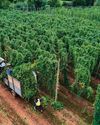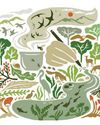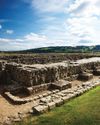
A colossal eddy that looks as if someone has just pulled the plug on the seas surrounding the Inner Hebrides, the Corryvreckan whirlpool is a freak of nature that spawns like a poisonous toad on a rising tide between the islands of Jura and Scarba.
From the Norse king Breacan who, legend has it, drowned in the whirlpool after trying to impress a local princess - to George Orwell's entanglement with it in 1947 while he was living on Jura writing Nineteen Eighty-Four, the whirlpool holds a distinctive place in Scottish culture.
The nature writer Roger Deakin considered attempting to swim across the Gulf of Corryvreckan (the strait between the two islands) when he was writing his classic work Waterlog. Approaching it on Jura, he describes in the book how he could hear the maelstrom before he saw it, sounding like "a low-pitched, continuous seething of brawling waves". It was 300 metres offshore, and within its circumference was a "mêlée of struggling white breakers... headbutting one another". Deakin backed out, saying an attempt would have been suicidal.
The first person known to have swum the Corryvreckan was, in fact, Orwell's brother-in-law Bill Dunn, who had spent some time living on Jura. Smeared in sheep fat, he completed the swim in 1949, despite having only one leg. It took him about half an hour.
The adventure tour group Swimtrek.com has run open-water swimming tours that take in a crossing from Jura to Scarba. According to Swimtrek's Jack Hudson (who has swum it himself), this can only be done safely at slack tide and when wind speeds are low. Even then, there are unusual currents that can be nerve-racking, he says.
"If you jumped into the maelstrom at full force, you would be sucked down and disappear very quickly," Jack says.
This story is from the July 2023 edition of BBC Countryfile Magazine.
Start your 7-day Magzter GOLD free trial to access thousands of curated premium stories, and 9,000+ magazines and newspapers.
Already a subscriber ? Sign In
This story is from the July 2023 edition of BBC Countryfile Magazine.
Start your 7-day Magzter GOLD free trial to access thousands of curated premium stories, and 9,000+ magazines and newspapers.
Already a subscriber? Sign In

TOP 10 REMOTE PLACES IN THE UK
There's something aweinspiring about a place that's remained untamed. Dixe Wills picks his favourite wild sites

Pub closures and fewer hops leave UK brewers in a fight for survival
Fancy a pint?

Will a new national trail provide better access to nature?
Before sitting down to write this I went for a brisk walk along a public footpath at the edge of my village and felt much better for it.

BRITAIN'S 'ROYAL FISH' ON THE BRINK OF EXTINCTION
Urgent conservation action is required if we're to save the sturgeon from disappearing from UK waters, say experts

STRATEGIC TREE PLANTING TAKES ROOT
New agroforestry guide helps farmers meet environmental goals

Coalition of the willing
Growing a rainforest takes time, ingenuity and passion.Oh, and a bit of dragon skin. Danny Graham meets the people fighting to save Scotland's rare habitats

Noticing nature daily can help us understand ourselves and the world
For over 120 years, The Guardian's Country Diary has delivered a daily portrait of an intimate view of the countryside (or nature, wherever we find it) from across Britain.

“WITCHES MARKS’ FOUND AT MEDIEVAL MANOR HOUSE
The staggering” number of carved rituals elevates 15th-century Gainsborough Old Hall to one of Britain’s spookiest buildings

Poison on your pooch?
You want to protect your dog from fleas and ticks, but the treatments may be contaminating our rivers, say scientists. James Fair looks at the best ways to fight parasites, for both pets and planet

RARE ROMAN KNIFE HANDLE DISCOVERED AT HADRIAN’S WALL
Find in the River Tyne in Northumberland proves celebrity cult’ of gladiators, say experts